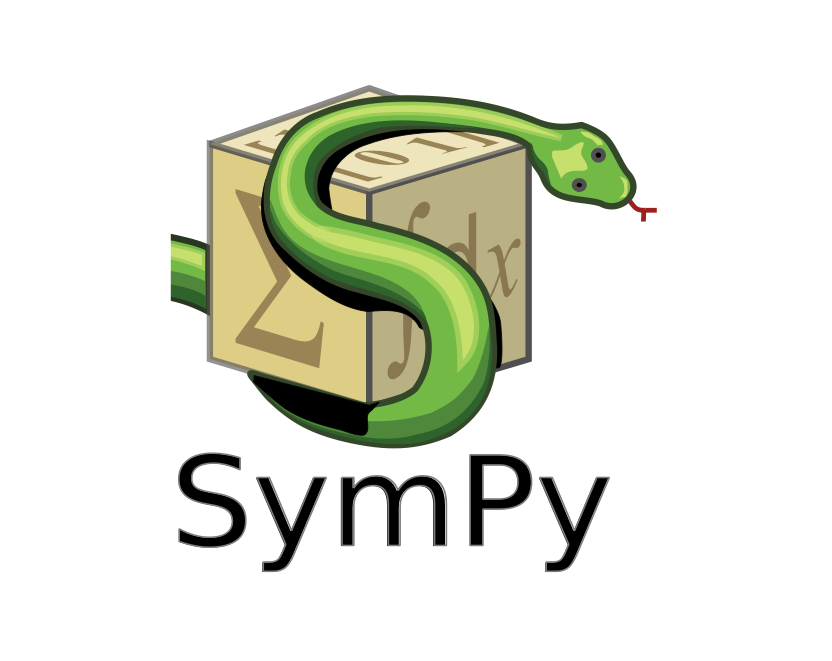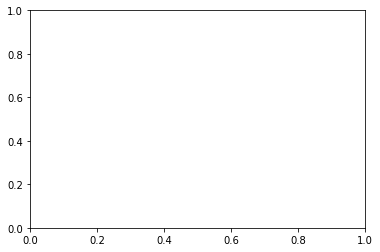Sympy¶

Introducción¶
Hay dos sistemas de álgebra computarizada (CAS) notables para Python:
SymPy: un módulo de Python que se puede utilizar en cualquier programa de Python, o en una sesión de IPython, que proporciona potentes funciones de CAS.
Sage - Sage es un entorno CAS muy potente y con todas las funciones que tiene como objetivo proporcionar un sistema de código abierto que compita con Mathematica y Maple. Sage no es un módulo Python normal, sino un entorno CAS que utiliza Python como lenguaje de programación.
Sage es en algunos aspectos más poderoso que SymPy, pero ambos ofrecen una funcionalidad CAS muy completa. La ventaja de SymPy es que es un módulo Python normal y se integra bien con el portátil IPython.
Para comenzar a usar SymPy en un programa o cuaderno de Python, importe el módulo sympy:
Para obtener una salida con formato LATEX atractiva, ejecute:
---------------------------------------------------------------------------
NameError Traceback (most recent call last)
<ipython-input-2-b0fddb2e1ad1> in <module>
----> 1 init_printing()
2
3 # or with older versions of sympy/ipython, load the IPython extension
4 #%load_ext sympy.interactive.ipythonprinting
5 # or
NameError: name 'init_printing' is not defined
Variables simbólicas¶
En SymPy necesitamos crear símbolos para las variables con las que queremos trabajar. Podemos crear un nuevo símbolo usando la clase Symbol:
Podemos agregar suposiciones a los símbolos cuando los creamos:
Evaluación numérica¶
SymPy usa una biblioteca para precisión artística como backend numérico, y tiene expresiones SymPy predefinidas para una serie de constantes matemáticas, como: pi, ʻe, ʻoo para infinito.
Para evaluar una expresión numéricamente podemos usar la función evalf (o N). Toma un argumento “n” que especifica el número de dígitos significativos.
Cuando evaluamos numéricamente expresiones algebraicas, a menudo queremos sustituir un símbolo por un valor numérico. En SymPy lo hacemos usando la función subs:
Por supuesto, la función subs también se puede utilizar para sustituir símbolos y expresiones:
También podemos combinar la evolución numérica de expresiones con matrices Numpy:
---------------------------------------------------------------------------
NameError Traceback (most recent call last)
<ipython-input-26-55617d5250d0> in <module>
----> 1 y_vec = numpy.array([N(((x + pi)**2).subs(x, xx)) for xx in x_vec])
<ipython-input-26-55617d5250d0> in <listcomp>(.0)
----> 1 y_vec = numpy.array([N(((x + pi)**2).subs(x, xx)) for xx in x_vec])
NameError: name 'N' is not defined
Sin embargo, este tipo de evolución numérica puede ser muy lenta, y hay una manera mucho más eficiente de hacerlo: use la función lambdify para” compilar “una expresión Sympy en una función que sea mucho más eficiente para evaluar numéricamente:
---------------------------------------------------------------------------
NameError Traceback (most recent call last)
<ipython-input-28-6d4989e762f0> in <module>
----> 1 f = lambdify([x], (x + pi)**2, 'numpy') # the first argument is a list of variables that
2 # f will be a function of: in this case only x -> f(x)
NameError: name 'lambdify' is not defined
La aceleración cuando se utilizan funciones lambdify en lugar de una evaluación numérica directa puede ser significativa, a menudo de varios órdenes de magnitud. Incluso en este ejemplo simple obtenemos una velocidad significativa:
---------------------------------------------------------------------------
NameError Traceback (most recent call last)
<ipython-input-30-1c1dd8f88b09> in <module>
----> 1 get_ipython().run_cell_magic('timeit', '', '\ny_vec = numpy.array([N(((x + pi)**2).subs(x, xx)) for xx in x_vec])\n')
~/.cache/pypoetry/virtualenvs/mat281-2021-V7B8LTfe-py3.8/lib/python3.8/site-packages/IPython/core/interactiveshell.py in run_cell_magic(self, magic_name, line, cell)
2401 with self.builtin_trap:
2402 args = (magic_arg_s, cell)
-> 2403 result = fn(*args, **kwargs)
2404 return result
2405
~/.cache/pypoetry/virtualenvs/mat281-2021-V7B8LTfe-py3.8/lib/python3.8/site-packages/decorator.py in fun(*args, **kw)
230 if not kwsyntax:
231 args, kw = fix(args, kw, sig)
--> 232 return caller(func, *(extras + args), **kw)
233 fun.__name__ = func.__name__
234 fun.__doc__ = func.__doc__
~/.cache/pypoetry/virtualenvs/mat281-2021-V7B8LTfe-py3.8/lib/python3.8/site-packages/IPython/core/magic.py in <lambda>(f, *a, **k)
185 # but it's overkill for just that one bit of state.
186 def magic_deco(arg):
--> 187 call = lambda f, *a, **k: f(*a, **k)
188
189 if callable(arg):
~/.cache/pypoetry/virtualenvs/mat281-2021-V7B8LTfe-py3.8/lib/python3.8/site-packages/IPython/core/magics/execution.py in timeit(self, line, cell, local_ns)
1167 for index in range(0, 10):
1168 number = 10 ** index
-> 1169 time_number = timer.timeit(number)
1170 if time_number >= 0.2:
1171 break
~/.cache/pypoetry/virtualenvs/mat281-2021-V7B8LTfe-py3.8/lib/python3.8/site-packages/IPython/core/magics/execution.py in timeit(self, number)
167 gc.disable()
168 try:
--> 169 timing = self.inner(it, self.timer)
170 finally:
171 if gcold:
<magic-timeit> in inner(_it, _timer)
<magic-timeit> in <listcomp>(.0)
NameError: name 'N' is not defined
---------------------------------------------------------------------------
NameError Traceback (most recent call last)
<ipython-input-31-395cef115f11> in <module>
----> 1 get_ipython().run_cell_magic('timeit', '', '\ny_vec = f(x_vec)\n')
~/.cache/pypoetry/virtualenvs/mat281-2021-V7B8LTfe-py3.8/lib/python3.8/site-packages/IPython/core/interactiveshell.py in run_cell_magic(self, magic_name, line, cell)
2401 with self.builtin_trap:
2402 args = (magic_arg_s, cell)
-> 2403 result = fn(*args, **kwargs)
2404 return result
2405
~/.cache/pypoetry/virtualenvs/mat281-2021-V7B8LTfe-py3.8/lib/python3.8/site-packages/decorator.py in fun(*args, **kw)
230 if not kwsyntax:
231 args, kw = fix(args, kw, sig)
--> 232 return caller(func, *(extras + args), **kw)
233 fun.__name__ = func.__name__
234 fun.__doc__ = func.__doc__
~/.cache/pypoetry/virtualenvs/mat281-2021-V7B8LTfe-py3.8/lib/python3.8/site-packages/IPython/core/magic.py in <lambda>(f, *a, **k)
185 # but it's overkill for just that one bit of state.
186 def magic_deco(arg):
--> 187 call = lambda f, *a, **k: f(*a, **k)
188
189 if callable(arg):
~/.cache/pypoetry/virtualenvs/mat281-2021-V7B8LTfe-py3.8/lib/python3.8/site-packages/IPython/core/magics/execution.py in timeit(self, line, cell, local_ns)
1167 for index in range(0, 10):
1168 number = 10 ** index
-> 1169 time_number = timer.timeit(number)
1170 if time_number >= 0.2:
1171 break
~/.cache/pypoetry/virtualenvs/mat281-2021-V7B8LTfe-py3.8/lib/python3.8/site-packages/IPython/core/magics/execution.py in timeit(self, number)
167 gc.disable()
168 try:
--> 169 timing = self.inner(it, self.timer)
170 finally:
171 if gcold:
<magic-timeit> in inner(_it, _timer)
NameError: name 'f' is not defined
Manipulaciones algebraicas¶
Uno de los usos principales de un CAS es realizar manipulaciones algebraicas de expresiones. Por ejemplo, podríamos querer expandir un producto, factorizar una expresión o simplemente una expresión. Las funciones para realizar estas operaciones básicas en SymPy se muestran en esta sección.
Expandir y factorizar¶
Los primeros pasos en una manipulación algebraica
La función expand toma un número de argumentos de palabras clave que podemos decirle a las funciones qué tipo de expansiones queremos que se realicen. Por ejemplo, para expandir expresiones trigonométricas, use el argumento de palabra clave trig = True:
Consulte help (expand) para obtener una explicación detallada de los distintos tipos de expansiones que pueden realizar las funciones de ʻexpand`.
Lo contrario, una expansión de producto es, por supuesto, factorización. El factor de una expresión en SymPy usa la función factor:
Simplificar¶
El “simplificar” intenta simplificar una expresión en una expresión agradable, utilizando varias técnicas. También existen alternativas más específicas a las funciones simplify: trigsimp, powsimp, logcombine, etc.
Los usos básicos de estas funciones son los siguientes:
Separados y juntos¶
Para manipular expresiones simbólicas de fracciones, podemos usar las funciones apart y together:
apart
together
Simplificar generalmente combina fracciones pero no factoriza:
Cálculo¶
Además de las manipulaciones algebraicas, el otro uso principal de CAS es hacer cálculo, como derivadas e integrales de expresiones algebraicas.
Diferenciación¶
La diferenciación suele ser sencilla. Utilice la función diff. El primer argumento es la expresión para tomar la derivada y el segundo argumento es el símbolo por el cual tomar la derivada:
Para derivados de orden superior podemos hacer:
Para calcular la derivada de una expresión multivariante, podemos hacer:
d3fdxdy2
Integración¶
La integración se realiza de manera similar:
Al proporcionar límites para la variable de integración, podemos evaluar integrales definidas:
y también integrales impropias:
Recuerde, oo es la notación SymPy para infinito.
Sumas y productos¶
Podemos evaluar sumas y productos usando las funciones: ‘Suma’
Los productos funcionan de la misma manera:
Límites¶
Los límites se pueden evaluar utilizando la función limit. Por ejemplo,
Podemos usar limit para verificar el resultado de la derivación usando la función diff:
df(x,y)dx=f(x+h,y)−f(x,y)h
Podemos cambiar la dirección desde la que nos acercamos al punto límite usando el argumento dir:
Serie¶
La expansión de la serie también es una de las características más útiles de un CAS. En SymPy podemos realizar una expansión en serie de una expresión usando la función series:
De forma predeterminada, expande la expresión alrededor de x=0, pero podemos expandir alrededor de cualquier valor de x al incluir explícitamente un valor en la llamada a la función:
Y podemos definir explícitamente en qué orden se debe realizar la expansión de la serie:
La expansión de la serie incluye el orden de la aproximación, lo cual es muy útil para realizar un seguimiento del orden de validez cuando hacemos cálculos con expansiones de la serie de diferente orden:
Si queremos deshacernos de la información del error, podemos usar el método removeO:
Pero tenga en cuenta que esta no es la expansión correcta de cos(x)sin(x) a 5 ésimo orden:
Álgebra lineal¶
Matrices¶
Las matrices se definen usando la clase Matrix:
Con las instancias de la clase Matrix podemos hacer las operaciones habituales de álgebra matricial:
Y calcular determinantes e inversas, y similares:
Resolver ecuaciones¶
Para resolver ecuaciones y sistemas de ecuaciones podemos usar la función resolver:
Sistema de ecuaciones:
En cuanto a otras expresiones simbólicas:

